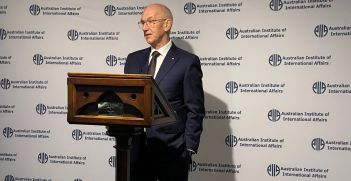High Technology and India-Japan Strategic Cooperation

The pursuit of tech supremacy is reshaping the global order. The strategic importance of the fourth Industrial Revolution (4IR) and mastery over strategic technologies are shaping the great power game.
The power and politics of technology, and its impact on geopolitics and national security, have become more pronounced with the intensifying Sino-US strategic contestation. Beijing’s Made in China 2025 and China Standards 2035 strategies are aimed at challenging Western competitiveness in high-tech sectors. In response, some major powers are tightening export control and licensing practices on emerging technologies.
The global conversation today on the imperative of building coalitions of like-minded countries, aimed at promoting and regulating advanced technologies, has a political context. As such, strategic vulnerabilities in critical technologies and related supply chains are shaping global initiatives and creating opportunities for like-minded democracies like India and Japan to join forces in the search for solutions and practical cooperation in high technology. For instance, a D-10 club of democracies is shaping up to alleviate risks in 5G; a Global Partnership of Artificial Intelligence backs cutting-edge research on artificial intelligence (AI); and a Quad Tech Network facilitates research on emerging tech challenges beyond the government to government (G2G) level.
Japan has remained a frontrunner in high technology and innovation. As suggested in the Fifth Science and Technology Basic Plan, Japan has mainstreamed Society 5.0 in its political agenda with a focus on digital technologies including big data analytics, AI, internet of things (IoT), and robotics. To this end, Tokyo has elevated its science and technology budget to $38 billion in 2019.
Maintaining an edge in innovation, augmenting research and development (R&D) into emerging technologies, moderating technology transfer, and protecting intellectual property are vitally important. Japan’s National Security Council has instituted an economic team to deal with these tech challenges. A recent survey conducted by Kyodo suggested that over 40 percent of Japanese technology firms believed to possess sensitive technology related to security are considering diversifying from China to Southeast Asia and India.
As a response to Japan’s technological prowess, Indian policy elites are seeking to deepen strategic technology cooperation with Japan in key areas like AI, fintech, space, rare earths and advanced material, critical cyber infrastructure, and advancing resilient supply chain for information and communications technology (ICT) products. As Special Strategic and Global Partners, India and Japan have signed a memorandum of understanding (MOU) in ICT advancing cooperation in 5G technologies, telecom security, spectrum management, and construction of the new submarine optical fibre cable.
Japan’s policy choices are connected to geopolitics. Regarding 5G, Japan’s 2018 guidelines for government procurement of IT products and services urge contractors to be cautious about cyber-security and supply-chain risks, inferring, yet not naming, specific Chinese vendors. Japan has additionally extended tax incentives to motivate investment in secured 5G infrastructure and alleviate supply-chain risks. Companies like NTT and NEC are working together on a made in Japan 5G alliance.
Countries often realise the imperative of collaboration, recognising strengths and weaknesses in different areas of innovation. This is pertinent in the opportunities for cooperation presented between Japan’s Rakuten and India’s Jio on 5G and designing a telecom supply chain. For example, Rakuten’s 5G network, which is based on Open Radio Access Network (O-RAN) technology, has enlisted the help of Indian tech companies and is collaborating with Sterlite Technologies for hardware and with HCL, Wipro, and Tech Mahindra for software.
Japan’s global competitiveness in optical submarine cable infrastructure has led India to partner with Japanese companies for advancing the Digital India programme. NEC played an instrumental role in connecting the strategic Andaman and Nicobar Islands with Chennai. India is pursuing other submarine optical fibre cable projects connecting Kochi and Lakshadweep Islands, where it may seek to enlist the support of Japan once again. Japanese companies are also participating in the Singapore-Myanmar-India Submarine Cable, aimed at advancing communications networks from Asia.
Advancing smart islands and smart city projects in India with clean and energy efficient technologies also features as a top priority in India-Japan relations due to their capacity to address challenges pertaining to energy security, the economy, and the environment. In the shift from fossil fuel toward cleaner and renewable energy, having the technological know-how, financing, and infrastructure is expected to realign international power dynamics and energy geopolitics.
In addition to telecommunications technologies, AI is embedded in Tokyo’s growth strategy. The Strategic Council for AI Technology formulated Japan’s Artificial Intelligence Technology Strategy, clearly outlining Japan’s AI R&D and industrialisation plan to develop an AI ecosystem by 2030. Technological breakthroughs in AI and robot sensors are key to leading the future revolution in productivity. Japan expanded the R&D tax exemption to include AI and big data and subsidies for building new robots with integrated AI.
While AI is harnessed by major powers since it is poised to revolutionise manufacturing, labour markets, trade, and defence, discussion concerning its impact on geopolitics is equally important. Countries that are currently invested in taking a lead in AI innovation will not only have an edge in global competitiveness but also geopolitical power balance. Thus, building an ecosystem furthering R&D in AI start-ups as well as advancing human capital is indispensable.
Recognising this geopolitical significance, India’s NITI Aayog has identified Japan as a potential partner to create AI solutions alongside a few others including the US, the UK, Germany, and Singapore. Advancing cooperation on AI, a MOU was signed between the AI Research Centre (AIRC) at the National Institute of Advance Science and Technology (AIST) in Japan and the Indian Institute of Technology (IIT) in Hyderabad.
The Japan-India Digital Partnership also taps opportunities in the start-up ecosystem. NASSCOM and JETRO are deepening cooperation and putting the start-ups and tech firms in touch with Japanese venture capitalists and strategic partners. Advancing cooperation in fintech, there are MOUs between the Fintech Association of Japan (FAJ) and FICCI, and between FINOLAB and Mumbai Fintech Hub.
Besides 5G, AI, and fintech, India and Japan are also deepening cooperation in space and defence sectors. The India-Japan Space Dialogue culminated from the strategic alignment in shaping space security and space-related norms. Tech collaboration towards the Joint Lunar Polar Exploration Mission demonstrates the depth of this strategic partnership. In the defence sector, Japan’s Strategy on Defence Production and Technological Bases urges participation in joint development projects and encourages building collaboration with the US, European partners, Australia, Southeast Asia, and India. India and Japan are pursuing cooperative research in the area of unmanned ground vehicle (UGV)/robotics. Besides, dual-use technologies hold enormous potential.
Geopolitics and technology are deeply intertwined in the digital age, where technology contributes to national power. As the race for tech dominance intensifies in the Sino-US systemic competition, stakes are high for other major powers. Managing tech dependence amid trends of techno-nationalism is testing major powers. It demands effective cooperation while navigating export controls, investment constraints, and information security and creative collaboration in high technology. American President Joe Biden has urged the “the free world” to unite against China’s “high-tech authoritarianism.” Liberal democracies should unite to chart common rules, norms, and standards governing emerging technologies. Balancing developmental priorities and wealth creation, national security challenges, and cost-competitiveness of technology present hard choices. But it also opens new opportunities for policy elites in India and Japan to tap into the transformative potential of strategic technology driving redistribution of power in international relations.
Dr Titli Basu is an associate fellow at the Manohar Parrikar Institute for Defence Studies and Analyses, India. Her research interests include strategic affairs in East Asia with focus on Japan, and great power competition in the Indo-Pacific. She was a visiting fellow at the National Institute for Defense Studies (NIDS, Tokyo) in 2017.
This article is published under a Creative Commons Licence and may be republished with attribution.





